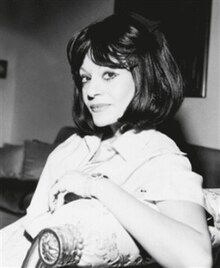Ghada al-Samman
| Ghadah Al-Samman غادة السمّان |
|
|---|---|
 |
|
| Born | 1942 (age 74–75) Damascus, Syria. |
| Occupation | Novelist, Journalist. |
| Language | Arabic, English, French. |
Ghadah Al-Samman (Arabic: غادة السمّان) is a Syrian writer, journalist and novelist born in Damascus in 1942 to a prominent and conservative Damascene family, she is remotely related to Nizar Qabbani the famous poet. Her father was Ahmed Al-Samman, a president of the Syrian University. She was deeply influenced by him since her mother died at a very young age.
Her father was fond of both Western literature and Arabic literature; this influenced her deeply and gave her a unique style that combines attributes of both. Nevertheless, she soon was confronted with the conservative Damascene society in which she was raised and lived her early years.
She published her first book of short stories عيناك قدري “Your Eyes are my Destiny” in 1962 which was received reasonably well. However, she was lumped at the time with other traditional feminine writers. Her later publications took her out of the tight range of feminine and love novels to much wider social, feminist and philosophical extents.
She graduated from the Syrian University in 1963 with a BA in English Literature and left to Beirut to earn her master's degree in Theatre from American University of Beirut; since then she had not returned to Damascus.
In Beirut she worked in journalism and in 1965 she published her second collection لا بحر في بيروت “No Sea in Beirut” in which the effect of her new, now wider experiences are evident. She then traveled around Europe working as a correspondent and in 1966 published her third collection ليل الغرباء “Foreigners’ Nights” reflecting her experiences.
The Six-Day War had a shock effect on her as it did on many of her generation, this was evident in her famous article احمل عاري إلى لندن “I Carry My Shame to London”, after that she did not publish any books for six years but her journalistic articles became closer to the social reality and made her popular. The articles she wrote during that period became the source of some of her later publications.
...
Wikipedia
